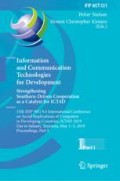Abstract
This paper addresses the topic on how WhatsApp can improve the lives of internally displaced persons (IDPs) affected by conflict. To theorize the complex relationship between mobile technologies and social inclusion, Sen’s five distinct instrumental freedoms was drawn upon to understand the use of WhatsApp by IDPs affected by Boko Haram insurgency in Nigeria and its impact on their social inclusion. Based on a one-week fieldwork of an ongoing research, the case narrative presented both the freedom outcomes afforded the IDPs by the use of WhatsApp and also the impediments that hinder the developmental impact. Finally, we conclude by providing some implications for research and practice.
Access this chapter
Tax calculation will be finalised at checkout
Purchases are for personal use only
References
AbuJarour, S., Krasnova, H.: E-learning as a means of social inclusion: the case of Syrian refugees in Germany. In: Americas Conference on Information Systems (AMCIS 2018), New Orleans, LA, 16–18 August 2018 (2018)
AbuJarour, S., Krasnova, H.: Understanding the role of ICTs in promoting social inclusion: the case of Syrian refugees in Germany. In: European Conference on Information Systems (ECIS 2017), Guimarães, Portugal (2017)
AbuJarour, S.A., Krasnova, H., Hoffmeier, F.: ICT as an enabler: understanding the role of online communication in the social inclusion of Syrian refugees in Germany. In: Proceedings of the 26th European Conference on Information Systems, Portsmouth, pp. 1–17 (2018)
Andrade, A., Urquhart, C.: Unveiling the modernity bias: a critical examination of the politics of ICT4D. Inf. Technol. Dev. 18(4), 281–292 (2012)
Andrade, A.D., Doolin, B.: Information and communication technology and the social inclusion of refugees. MIS Q. 40(2), 405–416 (2016)
Alkire, S.: Why the capability approach? J. Hum. Dev. 6(1), 115–135 (2005)
Bacishoga, K.B., Hooper, V.A., Johnston, K.A.: The role of mobile phones in the development of social capital among refugees in South Africa. Electron. J. Inf. Syst. Dev. Ctries. 72(1), 1–21 (2016)
Caidi, N., Allard, D., Quirke, L.: Information practices of immigrants. Annu. Rev. Inf. Sci. Technol. 44(1), 491–531 (2010)
Cetinkaya, L.: The impact of Whatsapp use on success in education process. Int. Rev. Res. Open Distrib. Learn. 18(7) (2017)
Chiumbu, S.: Exploring mobile phone practices in social movements in South Africa–the Western Cape anti-eviction campaign. Afr. Identities 10(2), 193–206 (2012)
Clarke, V., Braun, V.: Thematic analysis. In: Michalos, A.C. (ed.) Encyclopedia of Quality of Life and Well-Being Research, pp. 6626–6628. Springer, Dordrecht (2014). https://doi.org/10.1007/978-94-007-0753-5
Diminescu, D., Renault, M.: TIC et parrainage dans les mouvements militants de défense des sans-papiers en France. tic&société 3(1–2) (2009)
Hyde-Clarke, N.: The impact of mobile technology on economic growth amongst’survivalists’ in the informal sector in the Johannesburg CBD, South Africa. Int. J. Bus. Soc. Sci. 4(16) (2013)
Gifford, S.M., Wilding, R.: Digital escapes? ICTs, settlement and belonging among Karen youth in Melbourne. Australia. J. Refug. Stud. 26(4), 558–575 (2013)
IOM 2017. IOM Framework for Addressing Internal Displacement (2017). https://www.iom.int/sites/default/files/press_release/file/170829_IDP_Framework_LowRes.pdf. Accessed 11 Jan 2019
Kutscher, N., Kreß, L.: Internet is the same like food – an empirical study on the use of digital media by unaccompanied minor refugees in Germany. Transnatl. Soc. Rev. 6(1–2), 200–203 (2016)
Navarrete, C., Huerta, E.: Building virtual bridges to home: the use of the Internet by transnational communities of immigrants. Int. J. Commun. Law Policy, 1–20 (2006)
NBS 2017: Telecommunication Sector Data (2017). https://www.nigerianstat.gov.ng/download/729. Accessed 08 Nov 2019
Nyemba-Mudenda, M., Chigona, W.: mHealth outcomes for pregnant mothers in Malawi: a capability perspective. Inf. Technol. Dev. 24(2), 245–278 (2018)
Nussbaum, M.: Women’s capabilities and social justice. J. Hum. Dev. 1(2), 219–247 (2000)
PremiumTimes: Four UN aid workers killed, one abducted in Rann Attack (2018). https://www.premiumtimesng.com/news/headlines/260374-four-un-aid-workers-killed-one-abducted-rann-attack.html. Accessed 23 Aug 2018
Pridmore, J., Mols, A., Wang, Y., Holleman, F.: Keeping an eye on the neighbours: Police, citizens, and communication within mobile neighbourhood crime prevention groups. Police J., 1–24 (2018). https://journals.sagepub.com/doi/full/10.1177/0032258X18768397
Robeyns, I.: The capability approach: a theoretical survey. J. Hum. Dev. 6(1), 93–117 (2005)
Sahay, S., Walsham, G.: Information technology, innovation and human development: hospital information systems in an Indian state. J. Hum. Dev. Capab. 18(2), 275–292 (2017)
Sen, A.: Freedom as development (1999)
UNHCR: Global Trends: Forced Displacement in 2017 (2017). https://www.unhcr.org/globaltrends2017/. Accessed 18 Jan 2018
Van Steden, R., Van Caem-Posch, B., Boutellier, J.C.J.: The ‘hidden strength’ of active citizenship: the involvement of local residents in public safety projects. Criminol. Crim. Justice 11(5), 433–450 (2011)
Walsham, G.: Doing interpretive research. Eur. J. Inf. Syst. 15(3), 320–330 (2006)
Warschauer, M.: Technology and Social Inclusion: Rethinking the Digital Divide. MIT Press, Cambridge (2004)
Author information
Authors and Affiliations
Corresponding author
Editor information
Editors and Affiliations
Rights and permissions
Copyright information
© 2019 IFIP International Federation for Information Processing
About this paper
Cite this paper
Dasuki, S.I., Abubakar, N.H. (2019). The Contributions of WhatsApp to Social Inclusion: A Case of Internally Displaced Persons in Nigeria. In: Nielsen, P., Kimaro, H.C. (eds) Information and Communication Technologies for Development. Strengthening Southern-Driven Cooperation as a Catalyst for ICT4D. ICT4D 2019. IFIP Advances in Information and Communication Technology, vol 551. Springer, Cham. https://doi.org/10.1007/978-3-030-18400-1_34
Download citation
DOI: https://doi.org/10.1007/978-3-030-18400-1_34
Published:
Publisher Name: Springer, Cham
Print ISBN: 978-3-030-18399-8
Online ISBN: 978-3-030-18400-1
eBook Packages: Computer ScienceComputer Science (R0)


